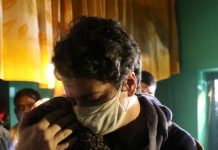
Thanks to the joint efforts of the Indian Navy and the Indian Air Force, Operation Rahat has entered a crucial phase in bringing back home the Indians stranded in Yemen. Among those who returned were the nurses who had migrated from Kerala to the war-torn country in search of livelihood. However, their joy of having got back home safely did not last long. Now, they find themselves at a dead end, having lost their source of income and staring at mounting debts and an uncertain future.
On 4 July, Remya AR, a nurse hailing from Vettiyaar in Alappuzha district, returned to India and arrived at her husband’s house at Mavelikara. She was among the lucky few who had boarded an Air India flight from Djibouti, a country neighbouring Yemen. Before that, she had spent several traumatic days without food and water.
“I can never forget the sheer horror of it all. A shell hit our hospital during an air raid by Saudi Arabia on 26 March,” says Remya. She reminisces about the hardships she and her colleagues had to undergo on the way to the seaport where the Indian Navy had docked its rescue ship. “The streets were crowded with security personnel armed to the teeth. Even small kids were spotted carrying arms bigger than their size,” she recalls.
Remya had paid Rs 2 lakh to a placement agent to land a job at a private hospital in Yemen for a monthly salary of Rs 40,000. Before that, she was working at a hospital in New Delhi for a menial wage that did not cover the cost of living in the city. Mounting debts and hope for a better life prompted her to take up the overseas offer.
“Ten months later, I am back at my home without having saved a penny,” she says. “I had to leave my passport and other documents behind while fleeing the hospital along with 26 of my colleagues. I have returned to a harsher fate than what I had sought to escape a year ago.” She wants the war to end soon so that she can go back to Yemen.
Another nurse Manju James, however, does not want to return to Yemen even if things become normal. “I have suffered a lot and want to erase all those memories,” she says. But she, too, is apprehensive about the future as she has a debt of around Rs 7 lakh.
According to Jinu Jacob from Ernakulam, after the Shiite Houthi rebels took over the hospital she worked for, around 280 of her colleagues have been trapped there. The hospital authorities are not returning the passports or paying the pending salaries to the nurses. Since most of them have been working there for so many years, they find it difficult to return without experience certificates and salaries. Jinu, who keeps in touch with her friends in Yemen over phone, says that her colleagues are now boycotting work to get their documents and salaries. “The situation has gone from bad to worse with Saudi Arabia escalating the air raids,” she says.
Shyju, who is stranded in Yemen, tells Tehelka over phone, “We are deprived of food and water. The shops are closed and the prices of eatables have shot up.” He says he is trying to get his passport back from the hospital authorities.
Asked why he went to Yemen in the first place, Shyju says, “The hospitals in Kerala and north India that I worked for early did not pay enough to live on. That is why I had to go to Yemen. But now, I have no option but to try and leave as soon as possible. I need to be alive to pay back my debts.”
Many nurses, mostly from poor families in the central Travancore region of Kerala, had gone to Yemen after paying huge sums to placement agents, for which they had borrowed money from banks and moneylenders. Now, with their dreams of earning high wages in tatters, they have no clue how to pay back the debts.
Fleeced by Placement Agencies
The huge demand for nursing jobs abroad has given placement agencies based in Kerala the opportunity to ask for exorbitant fees. A nurse employed in Kuwait tells Tehelka over phone that he had pledged his house and property to raise Rs 18.5 lakh for paying the fee to Al Zarafa, an agency that was raided by income tax sleuths a week ago. After reaching Kuwait, he had to wait for three months to get the job. He is yet to receive any salary even after three months on the job.
According to an income tax officer, these agencies usually don’t give any receipt for the fees in order to evade taxes. The job-seekers do not complain to the authorities out of fear that it would destroy their ‘golden opportunity’. The agencies cash in on this situation and fleece the job-seekers.
Moreover, the officials who are supposed to help the emigrant workers often act as agents of the placement agencies, says the officer. The CBI recently arrested an employee of the Kochi Protector of Emigrants office for allegedly helping an agency in hiding the complaints filed against it.
Jasmin Sha, president of the United Nurses Association (UNA), tells Tehelka that the association has lodged several complaints against the agencies but to no avail. “This has been going on for many years,” says Sha. “Even though the government of India has fixed a ceiling of Rs 19,500 as ‘service charges’, the agencies demanded Rs 20-25 lakh as fees from those who sought jobs in Kuwait. And recently, in a meeting attended by some Kerala government ministers and other stakeholders, it was decided to fix the service charge at Rs 60,000. This is in violation of the ceiling fixed by the Centre.”
The Centre’s decision to ban private placement agencies and allow only the government bodies NORKA-Roots and the Overseas Development and Employment Promotion Council to send people abroad for employment has come as a relief to the nursing graduates in Kerala. However, Sha says that the decision would come into force only on 30 April and it would not benefit the job-seekers this year as most of the recruitment for Kuwait would have been done by then.
“Nurses from Kerala working around the world send huge amounts of money to the state. Yet the state government continues to be apathetic towards this community,” rues Sha.
The UNA has tried to persuade Kerala Labour Minister Shibu Baby John to follow the Philippines model of overseas recruitment. According to Sha, in the Philippines, overseas recruitments are done through the nursing association. “A nurse has to pay only $2,000 as fees and the association takes care of any additional costs,” he explains.
With more nurses stranded in Yemen expected to return in the days ahead, the government will have to chalk out plans for their rehabilitation. But, the Oommen Chandy government, which is stumbling from one political crisis to another, seems to have little time to sort out the nursing community’s problems.
editor@tehelka.com












